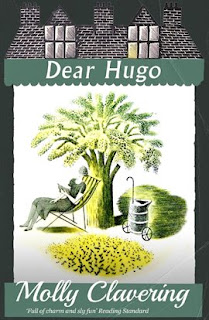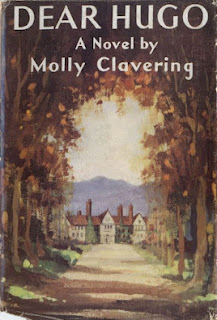Author: Molly Clavering (1900-1995)
Publication: Dean Street Press/Furrowed Middlebrow, paperback, 2021 (originally published in 1955)
Genre: Fiction
Setting: 1950s BritainDescription: Having lost her fiancé during the war, Sara Monteith decides to make a new home for herself in a small town called Ravenskirk in the Scottish Borders. This is where her fiancé and his brother Hugo grew up so it is natural that she writes to Hugo, working as a doctor in Africa, with light-hearted updates on her new home and neighbors, some of whom are friendly and some critical. In addition to managing the surprising number of social obligations, Sara is unexpectedly asked to take responsibility for her cousin’s son, 13-year-old Arthur called Atty. Although Atty goes to boarding school in Edinburgh, he adapts easily to holidays in the country with Sara, and he fills a hole in her life as Ravenskirk becomes a real home to both. The story is character-centered, featuring quiet humor mingled with more serious observations.
My Impression: Scott at Furrowed Middlebrow got me interested in Molly Clavering, an author I had not previously heard of. In my opinion, Clavering’s style resembles that of E.M. Delafield more than D.E. Stevenson; dry commentary more than laugh-out-loud humor, and Stevenson would have concluded this story more romantically, but the ending fit the characters and I enjoyed it. Scott reported that Clavering was Stevenson's neighbor and friend in Moffat, a small village that inspired Ravenskirk.Sara is unassuming and very private; she does not tell anyone in Ravenskirk about her deceased fiancé, although those who knew him would have welcomed her for his sake. I like the fact that Sara is somewhat hard up (although as we have all observed, in this era even a modest income was enough for household help – I would happily accept Sara’s controversial maid) and she is honest about it:
Like a fool I had said how lucky I considered myself in having been able to buy the little house at a price I could raise.Sara’s letters to Hugo reveal her humor and also her talent for friendship with a variety of people. Rationing still exists and when one of Sara’s guests is too lavish with the butter, Sara notices but decides it is worth it to have gained an outgoing new acquaintance. Now that Scott has brought eight of Clavering’s books back into print, I look forward to continuing my exploration of her work. Which one should I read next?
With a pitying smile she said, “But of course, Miss Monteith, you understand that this is not near the best part of Ravenskirk.” And stalked away.
Source: Library



sounds like one I'd enjoy! Will look for it.
ReplyDeleteDear Hugo is one of my favorites by Clavering, thank you for the nice review. I love the relationship with "Atty" and also the dog.
ReplyDeleteMrs Lorimer's Family(alt title Mrs Lorimer's Quite Summer) is also set in a boarders town inspired by Moffat, and some say major characters are inspired by (although not direct copies) Molly and DES.
I am also fond of Near Neighbors, set in Edinburgh. I would put these three at the top of my Clavering list.
I so loved this book! I have very much enjoyed all the books I've read by her. Mrs Lorimer's Quiet Summer, Because of Sam, and Susan Settles Down. I think this one, and Mrs Lorimer are my favorites.
ReplyDeleteYes, I also want to read more Clavering because of Dean Street Press.
ReplyDeleteI am looking forward to reading this soonish.
ReplyDeleteI must confess that I haven't heard of this author before, so thank you for the introduction. This sounds like a lovely story with a good balance between dry humour and more serious moments - just the kind of 'comfort reading' I enjoy. (Dean Street Press is doing such a great job in highlighting some of these lesser-known authors, it's really encouraging to see.)
ReplyDeleteSaving this review as I have this TBR! I'll be back ...
ReplyDeleteI've read four of Clavering's novels now and, while none have blown me away, Susan Settles Down is my favourite so far. Near Neighbours is also quite enjoyable (I liked it more on rereading than I did initially). I found Dear Hugo so engaging until the end, which I found so frustrating.
ReplyDelete